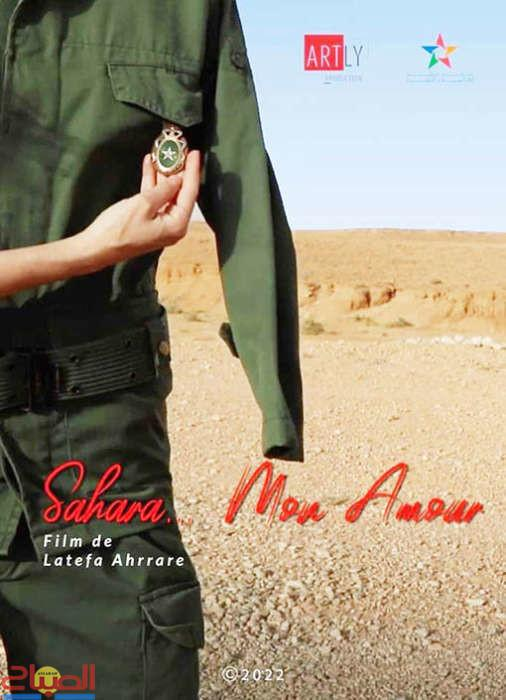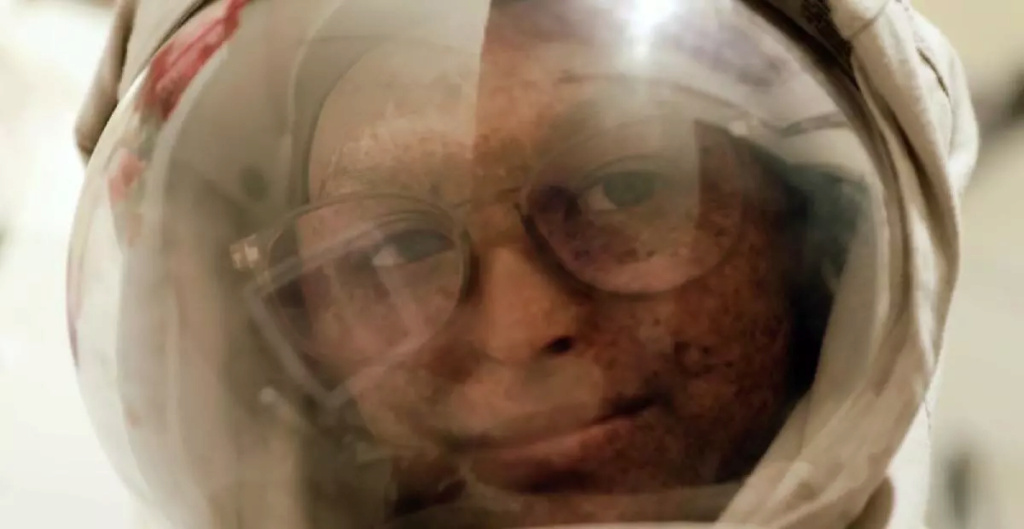Moroccan director Zineb Wakrim: "I dream of developing Amazigh cinema because for me it is the future"

Young Moroccan director Zineb Wakrim.
Young Moroccan director Zineb Wakrim is participating in the Film Schools competition with her short film "Ayour" (The Moon). In an interview with France 24, Wakrim expressed her overwhelming joy at being in the competition, and talked about her future projects in writing scripts and developing Amazigh cinema in particular. She called on her peers among young people working in the seventh art sector, "not to give up and to continue working while keeping hope for the future."
The young director Zineb Wakrim, who is participating in the Film Madras Competition at the Cannes Festival , represents the new face of the future of Moroccan cinema. Choosing her film to participate in one of the world's largest cinematic competitions did not come out of nowhere, but was the result of serious work, according to what she told France 24.
A graduate of one of the well-known film institutes in Marrakech confirms that her ambitions do not stop here, as she seeks to develop herself and work more and more. A lot, and you see her cinematic tomorrow.

More about Zainab and Karim's modern cinematic experience and her artistic aspirations in the following interview:
Why "Eeyore" as a name and a clue? That is, how did this topic come to you for the first time until it came into existence, and what is the reason for choosing this title?
When I was pursuing my film studies in Marrakech, we had, of course, rehearsals and workshops, and like any student, I used to prepare exam material recommendations. In parallel, I was doing research as part of a personal effort. I worked on a number of projects and at the same time researched cinematic concepts, including the concept of "Kinobraz", which left a great impression on me, by the Russian director Andrei Tarkovsky. And I tried to apply it. Also, thanks to the intervention of a specialist in the history of cinema, I discovered a film by Iranian director Forough Farrokhzad, which is a very poetic and humane film, from which I was inspired by the idea, because it has something to do with appearances. So that was the main and common point. Farrokhzad says: "Ugliness does not exist. When we see that one man is uglier than another, we discover beauty. When we see an ugly person as a human being, we discover beauty. Knowing how to portray ugliness will be tantamount to mitigating it. Not looking back makes beauty"... These phrases left a great impact . in. These are very touching words...
"Ayour" (a name in Amazigh that means light) is a study and research film. In it, I tried to apply the aforementioned Russian concept. Even if it is difficult, especially since it belongs to one of the geniuses of cinema. But for me, it was a way to understand more about this concept, and to immerse myself in the world of this director. And I chose the name "Eeyore" because it is attractive, and it arouses curiosity among others. A lot of people asked me this question and I gave them the same answer. I found a lot of films titled "Children of the Moon", the disease that I treat in my work. And I see a title that burns the topic. Burn the story. Yes it is heavy as a subject, but as a title "Eeyore" is the best for me.
Is the idea of disease that you chose as the subject of the film an event that deserves to be covered in cinema in many other works in Morocco? And why?
There are other subjects that deserve to be in motion pictures. As for the "Children of the Moon" theme, frankly, one movie is not enough to get the message across. If there are other people who wanted to get involved in this topic, and they have different ideas, and they have different points of view, why not... I like discovering new works very much. There are many other topics that also deserve to be addressed in cinematic films.

Screenshot from the movie "Eyeur"
Does thinking about directing Amazigh need conditions different from what is currently available? Or should Moroccan cinema focus more in its discourse on colloquialisms that everyone understands?
Honestly, when I thought about directing in Amazigh, it was somewhat difficult. Because I do not really master the Amazigh language even though I am an Amazigh woman, and I am wary of the Amazigh region of Tafraoute in the Souss region, and my mother is from Ait Baha, which means that I am 100 percent Sousse. Growing up with my grandparents, I used to talk to them about it, but when they passed away, I didn't speak it anymore. Therefore, I asked for help from friends who speak Amazigh in their homes in translating clips by director Farouk Zadeh, and we really succeeded in that, and this was a great gain for me. I hope that there will be a balance between colloquial and Amazigh films... There are many films in darija, but Amazigh films are still few. In the cinema, for example, I have not yet seen an Amazigh film. In all cases, in Amazigh or colloquial, these works remain Moroccan.
?How did you feel about having your film selected in one of the Cannes competitions
It was a wonderful surprise. My choice in the competition was shortly after obtaining a diploma at the end of my cinema studies. I would call it another start for a freshman at a point where she was asking me a bunch of questions. Like any novice who puts his feet in the field for the first time, he wonders if he is able to make a name for himself in it, and do I have the qualifications to impose myself as a director or director in the future... As if the Cannes Festival assured me that it was really a breakthrough. This film remains a school exercise, I worked on it well, and it gave a good result, and I am happy. For me, this is more of an assignment than an honor. I hope, God willing, that other Moroccan films will take their course to international festivals, and have a place in these international art forums.
Is it the beginning of success or a delicious initiation to assert oneself more in the field of directing and to sign other works that have chances in international competitions?
hopefully. There are projects in the future. I am now discussing projects with a number of professionals. I'm writing. Writing is a muscle exercise for any director and screenwriter. So we shouldn't stop here or wait for anyone's suggestion to start writing screenplays, but rather it should turn into a habit. And good will be in this direction, God willing.

?What movie do you dream of doing one day
There is no movie by itself that I dream of making one day. What I hope is to direct films that are accessible to everyone, regardless of age and class. He watches the old and the young, and can benefit the latter in his life, in his trials and in his future. I am also thinking of developing Amazigh cinema and working on it in turn, because for me it remains a project for the future.
?In your opinion, what is the health status of Moroccan cinema
Frankly, I cannot answer this question about Moroccan cinema, because there are people who are able to do that, such as researchers, critics, and other well-informed people. I liken myself to a medical student, who can't give his opinion more than a doctor. Indeed, there are people who are graduates of film schools that should be paid attention to, as they are waiting for someone to give them the opportunity instead of taking faces from social media. Cinema will be on the right track when given the chance. Morocco can steal the spotlight in the official competitions of the Cannes Festival when given the opportunity for these young people to create and propose various films, because each one has his own ideas, culture, and how to express them.
What does it mean to you to have a Moroccan female director on the jury at the Cannes Film Festival? I mean Maryam al-Tuzani .
Something very positive for our country, and I hope we will see other Moroccans in the same position. There are cinematic talents who deserve important positions on such occasions.
?La présence des films marocains au Festival de Cannes, cela signifie-t-il que le cinéma marocain est sur la bonne voie
En tant qu'étudiant, cette question est un peu compliquée pour moi. Mais je vais essayer de répondre, et ma réponse sera très, très personnelle. Pour la participation de plusieurs films marocains à Cannes comme le plus grand événement cinématographique au monde. Oui, être là reste important. Et le festival choisit des bièraubeurres auxquelles participer. Et il n'est pas facile de s'y faire une place. Mais pour moi, ce n'est pas une référence pour répondre à votre question. Parce qu'il y a un point d'interrogation. Il y a des films à un niveau qui n'est pas au niveau qui caractérise les films du Festival de Cannes, et malgré cela, ils sont présents dans cette démonstration, alors qu'il y a d'autres films marocains qui le méritent et qui n'en ont pas eu l'occasion. Quelque chose n'est pas clair.
?Un mot pour la jeunesse cinématographique marocaine, maghrébine et arabe en général
Mon message aux jeunes est qu'il ne faut pas baisser les bras, continuer à travailler dur et garder espoir en l'avenir. Un jour, chacun gagnera ce qu'il mérite, et il brillera dans la position qu'il mérite. Si Dieu le veut, ce sera bien à l'avenir. Nous restons positifs.
Source : websites

